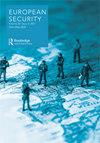Balancing between Russia and the West: the hard security choice of Armenia
IF 3.6
2区 社会学
Q1 AREA STUDIES
引用次数: 0
Abstract
ABSTRACTArmenia’s official foreign policy of complementarism aims to sustain national security and development by balancing strategic and friendly relations with Russia, while also engaging in multilevel political, economic and cultural interactions with the EU and the USA. However, after the 2020 Karabakh War and amidst the increasing confrontation between the West and Russia, complementarism faced unprecedented challenges. To investigate whether Armenian elites still adhere to the line of complementarism and to determine whether they reflect or contradict public perceptions of foreign policy, we gathered novel sociological data on foreign policy preferences in Armenian society through a nationwide survey, outlining changes and continuities in their perceptions over the past ten years. Our study reveals that Armenian elites have started to modify complementarism as they began to doubt Russia’s role in Armenian foreign policy, particularly in the context of the European neighbourhood. Armenian society’s trust in Russia has consistently declined, despite Moscow still being ranked as the main strategic ally in public perceptions. The misbalancing of complementarism by Armenian elites not only challenges Russia’s role in Armenian security and public opinion but also offers no viable alternative for the security of Armenia and the Armenian population in Karabakh.KEYWORDS: Armenian societyRussiaThe WestComplementarismKarabakh WarSecurity priorities Disclosure statementNo potential conflict of interest was reported by the author(s).Notes1 This foreign policy is also referred to as a “Complementarian” foreign policy or simply Complementarity, but in this article, we prefer the common term “Complementarism” as is common in the academic literature on the topic.Additional informationFundingThis work is part of the research project “Armenian Society on Crossroad: Foreign Political Orientation, Priorities and Perceptions,” funded by Konrad Adenauer Stiftung (Armenia) in 2021–2022.俄罗斯与西方之间的平衡:亚美尼亚的艰难安全选择
亚美尼亚官方的互补外交政策旨在通过平衡与俄罗斯的战略和友好关系来维持国家安全和发展,同时也与欧盟和美国进行多层次的政治,经济和文化互动。然而,在2020年卡拉巴赫战争之后,随着西方与俄罗斯之间的对抗日益加剧,互补性面临着前所未有的挑战。为了调查亚美尼亚精英是否仍然坚持互补路线,并确定他们是否反映或与公众对外交政策的看法相矛盾,我们通过一项全国性调查收集了关于亚美尼亚社会外交政策偏好的新颖社会学数据,概述了过去十年来他们看法的变化和连续性。我们的研究表明,亚美尼亚的精英们已经开始修改互补性,因为他们开始怀疑俄罗斯在亚美尼亚外交政策中的作用,特别是在欧洲邻国的背景下。亚美尼亚社会对俄罗斯的信任一直在下降,尽管莫斯科在公众心目中仍被列为主要的战略盟友。亚美尼亚精英的互补性失衡不仅挑战了俄罗斯在亚美尼亚安全和公众舆论中的作用,而且也没有为亚美尼亚和卡拉巴赫亚美尼亚人的安全提供可行的替代方案。关键词:亚美尼亚社会、俄罗斯、西方互补主义、卡拉巴赫战争、安全优先事项披露声明作者未报告潜在的利益冲突。注1这种外交政策也被称为“互补性”外交政策或简称互补性,但在本文中,我们更喜欢在学术文献中常见的“互补性”一词。这项工作是“十字路口的亚美尼亚社会:外国政治取向、优先事项和看法”研究项目的一部分,由康拉德·阿登纳基金会(亚美尼亚)于2021-2022年资助。
本文章由计算机程序翻译,如有差异,请以英文原文为准。
求助全文
约1分钟内获得全文
求助全文

 求助内容:
求助内容: 应助结果提醒方式:
应助结果提醒方式:


